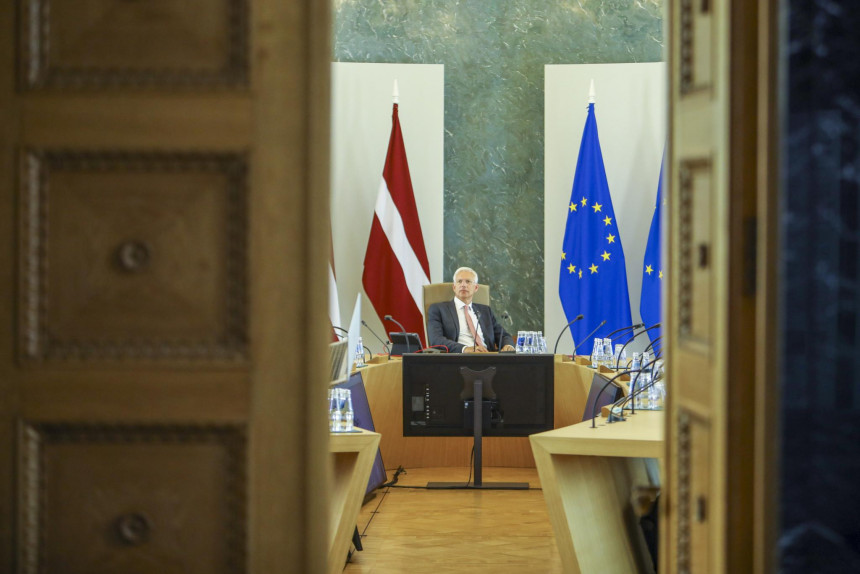Kariņš must start a social dialogue from the state policy based on blackmail

Exactly on the day of the Storming of Bastille - July 14 - Kariņš's government outlined a vision of the new reality of Latvia - an ever wider and deeper division of the population into vaccinated and non-vaccinated. According to the government's proposed amendments to the Law on the Management of Covid, from October 1, employees of medical, social care and educational institutions will only be allowed to work with a valid Covid certificate. Minister of the Interior Marija Golubeva, for her part, has said that this group is likely to be joined by employees of the interior system, including firefighters, among whom currently less than half are vaccinated.
When this government decision was made, it seemed that it would be pushed through the Saeima as soon as possible. All the more so because Kariņš himself called for these amendments to be declared urgent. However, the very next day it turned out that the Saeima would not consider these amendments so soon. Currently, due to the summer break, the Saeima plenary sittings are not taking place, and an extraordinary sitting will not be convened earlier than after three weeks. This uncoordinated action by the various branches of power casts doubt on how seriously this government decision was discussed in the coalition cooperation council before it was taken.
This three-week break is also intended to prevent any unexpected surprises in the vote itself. During this time, a consolidated opinion of all factions must be ensured, which will not be as easy on this particular issue as one might have thought when watching the Cabinet meeting. In my article I already warned that getting “high on success” is the main threat to Kariņš's government. The completely ill-considered nature of this government decision can be seen from every angle. Just like the lightness (frivolity) with which it was adopted. The very next day it became clear that even if these amendments to the law were adopted by the Saeima, the opposition would have no difficulty in collecting the signatures of 34 deputies, which would delay their entry into force for at least two months. Given that the law must definitely include a sufficiently long transition period, there will probably be legal possibilities to prevent its entry into force even longer.
However, the most difficult test these amendments will face will be when they enter into force. Even assuming that the majority of those who are skeptical about vaccination will eventually give in and agree to be vaccinated, there will certainly be a certain percentage of uncompromising people who will stand up for their rights. Proponents of compulsory vaccination argue that educators who are "against science" and do not want to be vaccinated are not needed at all and schools will be "cleaned up".
Let us set aside the moral and ethical aspects of this statement. Do we really have a surplus of teachers? Will we have enough substitutes for the teachers driven out from schools? We can hope that the number of such teachers will not be large and we will somehow survive their loss, similarly to how we survived the departure of 200,000 people from Latvia after the 2009 crisis and the subsequent "consolidation" of Valdis Dombrovskis. It can be said that there are no irreplaceable people, but it is also known that no action is left without consequences. These repressions against teachers who do not want to be vaccinated are unlikely to strengthen our country.
A particularly serious situation may develop in social care centers, where there is already a worrying shortage of staff. If the shortage of staff in these centers increases even more, then the biggest victims will be the people who need this care. In this case, too, it can be argued that unvaccinated social center workers pose a threat to the most Covid-vulnerable category of people, the elderly, but wouldn't it be easier to provide seniors with vaccines, thus protecting them from unvaccinated workers, and not the other way around?
A similar story is about firefighters. The low percentage of vaccinees indicates that there is serious resistance to compulsory vaccination in this environment. This means that there may be many firefighters who will leave rather than give in. If these people leave the fire service, it will mean that fire protection in the country will have seriously deteriorated.
The incalculable measure of the social tensions caused by such confrontational government decisions remains unnoted. However, the government does not seem to be worried about such stuff. It is ready for anything. Ready to go beyond all the frameworks of the rule of law and turn state politics into blackmail (no matter how noble the intentions may be).
So far, there is no indication that the long-term consequences of such a policy are considered. But it should be done, and it is not too late. We simply need to end this unnecessary struggle - who will break who, and instead start a peaceful dialogue on social reconciliation. All parties must stop acting like stubborn donkeys. The highest state officials must set an example for others. First of all - Prime Minister Krišjānis Kariņš.
